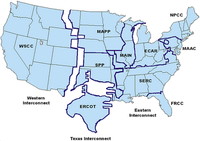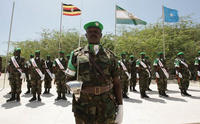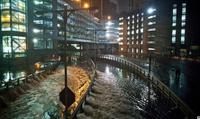-
Israel, Hamas on verge of cease-fire deal – or ground war

The Israeli government yesterday (Monday) postponed a decision on a ground invasion of the Gaza Strip — inside sources said the decision was to postpone the green light for an invasion for twenty-four hours — as intense negotiations in Egypt continue in an effort to reach a cease-fire agreement between Israel and Hamas
-
-
“Soft infrastructure” as storm surge defense alternatives
The flooding in New York and New Jersey caused by Superstorm Sandy prompted calls from Governor Andrew Cuomo and other officials to consider building storm surge barriers to protect Lower Manhattan from future catastrophes. Such a strategy, however, could make things even worse for outlying areas that were hit hard by the hurricane, such as Staten Island, the New Jersey Shore, and Long Island’s South Shore, a City College of New York landscape architecture professor warns; landscapers and engineers say that environmentally friendly “soft infrastructure” would mitigate flood damage without sending harm elsewhere
-
-
Sequestration will have a devastating impact on U.S. research enterprise
Three organizations representing more than 200 of the U.S. leading academic research institutions yesterday launched a Web site that aims to inform policymakers and the public of the impact that the upcoming budget sequester would have on federal funding for university research; the Web site highlights the importance of federally funded university research to innovation, economy, an society
-
-
Also noted
King to give up Homeland Security chairmanship | Syrian Islamist rebels reject West-backed opposition coalition, declare Aleppo Islamic state | Pentagon sees seizing Syria chemical arms as vast task | Iran’s first nuclear plant may have suffered new setback | UN nuclear agency: Iran poised to expand nuke work | Germany abandons nuclear power and lives to talk about it | Police-worn cameras being tested in West Valley | License plate scanners under fire | Fed ID Deadline Looms For N.M.| Ban ‘killer robots,’ rights group urges | Houston airport system embraces technology to share wait times for security checkpoints | Man with strange watch arrested at California airport
-
-
NYC bomb plotter sentenced to life

Adis Medunjanin, a 34-year old Bosnian-born U.S. citizen has been sentenced to life in prison for his role in a plot to bomb the New York subway; he was convicted in May of multiple U.S. terrorism offences, including conspiring to use weapons of mass destruction; two former schoolmates who helped Medunjanin to plan the attack had pleaded guilty and testified against him
-
-
DARPA seeking surveillance technology to predict future behavior
DARPA has teamed up with scientists from Carnegie Mellon University to create an artificial intelligence system that can watch and predict what a person will “likely” do in the future, using specially programmed software designed to analyze various real-time video surveillance feeds; the system can automatically identify and notify officials if it recognized that an action is not permitted, detecting what is described as anomalous behaviors
-
-
U.S. electric power grid “inherently vulnerable” to terrorist attacks: report

The U.S. electric power delivery system is vulnerable to terrorist attacks which could cause much more damage to the system than natural disasters such as Hurricane Sandy, blacking out large regions of the country for weeks or months, and costing many billions of dollars, says a newly released report by the National Research Council
-
-
Escalation: Hamas launches a Fajr-5 missile at Tel Aviv; no damage or casualties
An hour-and-a-half ago — around 11:30am EST, 18:30 Israel time – Palestinians from Gaza launched a Fajr-5 missile at Tel Aviv; Hamas said the missile was launched by the Islamic Jihad organization; the missile fell south of Tel Aviv, causing no damage or casualties; there is no doubt that a direct attack by Hamas on Tel Aviv constitutes, for Israel, a crossing a clearly delineated red line; what should we expect now? There are two possibilities: Hamas may consider the symbolic value of launching a missile at Tel Aviv as balancing the substantial and material blows it has suffered in the last twenty-four hours, and agree to Egyptian efforts to mediate a cease fire; if the past is an indication, however, then Israel will move one rung up the escalation ladder in response to this crossing of an Israeli red line before agreeing to a cease fire with Hamas
-
-
Israel’s operation in Gaza: limited goals – for now, I
In an impressive military move early Wednesday morning, Israel killed Ahmed Jabari, the top military leader of Hamas and a few of his lieutenants; even more impressively, and more meaningful strategically, the Israel Air Force (IAF) attacked dozens of targets across the Gaza Strip, destroying hundreds of Hamas missiles and rockets; the most important targets were storage facilities where mid-range Fajr-3 and Fajr-5 missiles were being kept, and dug-outs from which these missiles would be launched; in a few minutes, Hamas’s strategic ace in the hole was destroyed; but what are Israel’s broader goals, and can these goals be achieved?
-
-
Powerful debugging program to help U.S. nuclear deterrence
Lawrence Livermore National Laboratory (LLNL) researchers have used the Stack Trace Analysis Tool (STAT), a highly scalable, lightweight tool to debug a program running more than one million MPI processes on the IBM Blue Gene/Q (BGQ)-based Sequoia supercomputer; LLNL plans to use Sequoia’s impressive computational capability to advance understanding of fundamental physics and engineering questions that arise in the National Nuclear Security Administration’s (NNSA) program to ensure the safety, security, and effectiveness of the U.S. nuclear deterrent without testing
-
-
Israel kills Hamas top military leader, destroys Hamas Fajar missiles
In a precise targeted attack early today (Wednesday), the Israel Defense Force (IDF) killed Ahmad Jabari, the top military leader of Hamas; Jabari ran the organization’s armed wing, called the Izz el-Deen Al-Qassam; in a separate attack, Jabari’s deputy, Raed al-Atar, was also killed; the Israeli early morning strikes also included attacks on about twenty or so targets across the Gaza Strip. these attacks inflicted a heavy blow on Hamas’s military capabilities by destroying most of Hamas’s most threatening weapons – the mid-range Fajar missiles Hamas received from Iran and with which the organization could attack Tel Aviv and other cities in central Israel
-
-
African Union backs military campaign plan to end Islamist control of break-away north Mali

The time is running out for the al Qaeda-affiliated Islamist militants who seized control of the break-away region in northern Mali, as the African Union (AU) has backed a plan to send troops into Mali to evict them; the AU endorsed the decision by ECOWAS, an organization of West African countries, which, on Sunday, finalized and approved plans to send 3,300 troops to help Mali’s government take over the region and reunite the country; the ECOWAS plan will now be submitted to the UN Security Council for approval within the next three weeks
-
-
In 2009, engineers predicted surge threats to N.Y.-N.J. and offered detailed mitigation measures
The leaders of the U.S. top engineering association, reflecting on the destruction inflicted by Superstorm Sandy, say that more than three years ago the association presented studies showing that a devastating storm surge in the region was all but inevitable; participants in the 30-31 March 2009 American Society of Civil Engineers (ASCE) conference called on NYC officials seriously to consider whether to install surge barriers or tide gates in New York Harbor to protect the city
-
-
New book discusses storm surge protection for New York City

A new book from American Society of Civil Engineers (ASCE), to be published on 3 December, includes sixteen papers exploring the development of storm surge barriers to protect New York City and nearby New Jersey from the effects of a future deluge
-
-
New database offers insights into terrorism countermeasures
The National Consortium for the Study of Terrorism and Responses to Terrorism (START) recently published a report which discusses the development of the Countermeasures against Extremism and Terrorism (CoMET) Database, which catalogues government and non-government countermeasures taken in response to terrorist and extremist activities
-
More headlines
The long view
What Does Netflix’s Drama “Adolescence” Tell Us About Incels and the Manosphere?
While Netflix’s psychological crime drama ‘Adolescence’ is a work of fiction, its themes offer insight into the very real and troubling rise of the incel and manosphere culture online.
A Shining Star in a Contentious Legacy: Could Marty Makary Be the Saving Grace of a Divisive Presidency?
While much of the Trump administration has sparked controversy, the FDA’s consumer-first reforms may be remembered as its brightest legacy. From AI-driven drug reviews to bans on artificial dyes, the FDA’s agenda resonates with the public in ways few Trump-era policies have.
The Center Can Hold — States’ Rights and Local Privilege in a Climate of Federal Overreach
As American institutions weather the storms of executive disruption, legal ambiguity, and polarized governance, we must reexamine what it means for “the center” to hold.
How to Reverse Nation’s Declining Birth Rate
Health experts urge policies that buoy families: lower living costs, affordable childcare, help for older parents who want more kids
Foundation for U.S. Breakthroughs Feels Shakier to Researchers
With each dollar of its grants, the National Institutes of Health —the world’s largest funder of biomedical research —generates, on average, $2.56 worth of economic activity across all 50 states. NIH grants also support more than 400,000 U.S. jobs, and have been a central force in establishing the country’s dominance in medical research. Waves of funding cuts and grant terminations under the second Trump administration are a threat to the U.S. status as driver of scientific progress, and to the nation’s economy.
The True Cost of Abandoning Science
“We now face a choice: to remain at the vanguard of scientific inquiry through sound investment, or to cede our leadership and watch others answer the big questions that have confounded humanity for millennia —and reap the rewards.”
